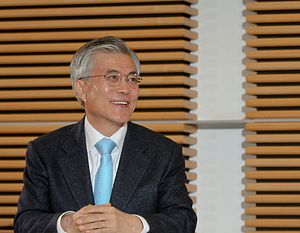U.S. President Donald Trump and South Korean President Moon Jae-in will hold their first face-to-face meeting in Washington, DC from June 29-30. The Trump-Moon summit faces formidable challenges. The North Korea issue tends to overshadow analysis previewing the summit, but potential economic cleavages will be important to Trump. One of the most important things for this meeting will be to develop trust and a good rapport between the two leaders, which can be based on a common understanding of issues.
Like former presidents Kim Dae-jung (the first opposition candidate elected after democratization, 1998-2003) and Roh Moo-hyun (who succeeded Kim Dae-jung and served from 2003-2008), Moon was an active participant in the student movement against the authoritarian government and the Yushin Constitution and later a human rights attorney. Trump may have been able to better talk to a fellow former businessman like Lee Myung-bak, but a disjuncture between Moon and Trump is not necessarily a foregone conclusion provided the summit results in favorable rapport between the two new leaders. Issue framing will be key.
As we’ve seen in Trump’s meetings with China’s Xi Jinping and Japan’s Shinzo Abe, the U.S. president’s dealings with at least two Asian powers have not been nearly as confrontational as might be expected from Trump’s campaign rhetoric. (Though we may now be seeing the limits of rapport with Xi without movement toward Trump’s stated key goals vis-à-vis North Korea.)
Moon’s camp can take a lesson from Trump’s meeting with Vietnamese Prime Minister Nguyen Xuan Phuc, where framing was key. Vietnam accounts for a large U.S. trade deficit ($32 billion), a key concern for the Trump administration. Despite potential Vietnamese losses following Trump’s withdrawal from the Trans-Pacific Partnership, the summit produced an $8 billion trade deal for U.S. commercial goods that Trump hopes will close the trade deficit. The U.S. Department of Commerce announced the deal would support 23,000 American jobs.
Trump has not addressed the U.S.-South Korea relationship very much since his inauguration, but during the campaign he made several disparaging remarks about Seoul as a “free-rider” in the security partnership. Since taking office, he’s again called the Korea-U.S. FTA “a horrible trade deal” and has suggested he may seek to renegotiate its terms.
At the top of the meeting, Moon will need to demonstrate South Korea’s commitment to maintaining the burden-sharing arrangement (which is gradually shifting more to the South Korean defense budget) as well as emphasizing how Korean companies have continued to invest in U.S. growth. Moon can begin by bringing up the amount of U.S.-based jobs and production that Korean companies and investment provide. South Korean investment in the United States has increased 700 percent over the past ten years. Korean-brand automobile production centers in the United States employ thousands of Americans — Hyundai and Kia factories have created 15,000 Alabama jobs, for example, and the automobile company has announced a plan to invest a further $3.1 billion over the next five years. SK Telecom has sought to expand its investments in Silicon Valley. Samsung earlier this year even announced it would shift home appliance manufacturing from Mexico to the United States to expand its presence there.
The economy is a particularly sensitive issue these days in South Korea, but Moon — who is enjoying an impressive 84 percent approval rating as of the first week of June — has time to smooth things over after the meeting with Trump. Otherwise, he risks getting dragged into massive renegotiations of the free trade agreement, which will reverberate into other aspects of the alliance. Deft framing in the appropriately casual and direct tone on the part of the South Koreans has the potential to assuage some of the doubts and uncertainties in the robust and multifaceted alliance going forward.
Darcie Draudt is a Ph.D. student in political science at Johns Hopkins University and non-resident James A. Kelly fellow at Pacific Forum CSIS.

































